
There has been a lot of discussion as to the merits and demerits of MOOCs for academic knowledge and HE. In this post, I would like to share my own experience from successfully completing my first MOOC in Copyright, offered by the University of Harvard . Going back to being a student again –let alone a Harvard student- has not been easy: the endless hours of listening to lectures on YouTube, preparing for the real-time online seminars but mostly having to take written exams that closely resemble the exam administered to students in the Harvard Law School course was a mentally challenging experience. And now that it is over –as amost students do at the end- I must admit I thoroughly enjoyed it.
According to a recent European Commission report on web skills (May 2014), a MOOC is defined as a “an online course open to anyone without restrictions (free of charge and without a limit to attendance), usually structured around a set of learning goals in an area of study, which often runs over a specific period of time (with a beginning and end date) on an online platform which allows interactive possibilities (between peers or between students and instructors) that facilitate the creation of a learning community. As it is the case for any online course, it provides some course materials and (self) assessment tools for independent studying”. Ever since their emergence in 2007, MOOCS have been met with disbelief and skepticism. Often argued to be a disruption to current HE business models, MOOCs have been heavily criticized for their low academic quality and limited pedagogical values and have been branded as an instance of technological disruption: in times of financial insecurity , the temptation to succumb to cheap alternatives, bringing down the costs of education is strong. On the other hand, keeping the entry costs low, MOOCs have been praised for their democratizing effect in offering education for all. Of course, distance learning and online education is not a new thing. Yet, since the early days of MOOCs in 2007, many things have changed: from 2011 onwards there has been a “digital tsunami” of MOOCs, most of which –although open and accessible to all- diverted from the original aim of offering open content hosted on non-proprietary platforms and open software.
Are MOOCs really an educational start up closer to venture capitalists rather than academics or do they offer an attractive online alternative to those unable to finance their studies?
CopyrightX is a course running for twelve-weeks, offered yearly under the auspices of Harvard Law School, the HarvardX distance-learning initiative, and the Berkman Center for Internet and Society. Advertised as a “course [that] explores the current law of copyright through a combination of pre-recorded lectures, weekly seminars, live webcasts, and online discussions, [helping participants to critically] examine and assess the ways in which law seeks to stimulate and regulate creative expression”, Copyrightx is rather different from most MOOCs, not quite ticking all the boxes. In this sense, although open in general, enrolment is limited to only 524 participants chosen by the course’s administrators. This has certainly not been one of those MOOCs that mere attendance is required, if at all. During the course of this unit, all students have the same responsibilities with the 100 Harvard law students attending the same unit on campus. Each week all students were required to watch a series of pre-recorded lectures delivered by the Director of the Berkman Institute, Prof. William Fisher, complete the readings and actively participate on a real-time seminar, led by a Harvard TA for over two hours on Adobe.
While the technology is still lacking the capacity to fully facilitate the needs of an online seminar group, this has certainly been a rewarding experience. Not only were we able to discuss on contemporary copyright issues and note future challenges but we were also able to gain insight to a broader perspective, each one of the participants sharing experiences from their own cultural background and academic expertise. Personally, I was pleased to share my views on digital copyright related issues and inform the relevant debate as well as get to know the other’s views and experiences, especially those from non-academic/legal domains. This interaction among peers is probably one of the most notable features of Harvard’s CopyrightX: not only was this possible during the weekly seminar real time, but it was also further facilitated in the form of two forums: one for each seminar section (garden) and a general forum open to all sections (forest). Of particular interest was also the material provided for further studying in the form of interactive online maps, prepared using the MindManager mapping programme. Last a series of special events featuring guest speakers helped in further contextualising all knowledge gained: Joshua Redman’s talk on creativity in music and Justin Hughes (principal negotiator on behalf of the United States of the 2013 Marrakesh Treaty to Facilitate Access for the Visually Impaired) account on negotiating copyright treaties have been equally thought provoking events.
Having completed probably one of the most competitive and demanding MOOCs out there, I was able not only to boost my copyright skills but also to gain great overview and overall experience in online learning and technology supported teaching. Is MOOCs the way to go for HE or the academic business model of Universities is still unrivalled? My view is that the things offered in both cases are different and in any case they can complement each other aiding better access to knowledge: MOOCs appear to be offering a learning experience, which presupposes absolute autonomy of the student. Although there are still certain weekly tasks and assessment upon successful exams at the end of the course, MOOCs would qualify more as a great tool to boost existent knowledge or build on already existing skills rather than create independent learners. As an academic, I benefited in various ways from this: in what could be described as a “participatory teaching environment”, all students were both tutors and tuttees, benefiting from their online interaction and exchange of expertise.
At the same time, in spite of the multifaceted ways in which one can benefit from MOOCs, the academic business model and Universities at large are still the basis of HE. The ethos and values of an academic environment, this agora of free deliberation among the students and the tutors cannot be replaced by online learning. The latter is merely transferring skills; the former is about building capacities and achieving personal development. As such, the success of MOOCs presupposes and relies heavily on a solid educational model of on-campus learning. This distinction should be made clear. In the words of Professor Darryl Tippens, provost of Pepperdine University: “If we aren’t careful, we will bifurcate education into two separate and unequal systems: the residential college education, which involves rich interactions between professors and students, enhanced by an array of heady co-curricular experiences with the goal, not just of information transfer, but transformation—the formation of competent, ethical citizens and whole human persons. The other model will promise less: somewhat depersonalized, “objective” and fact-based training; skills development that leads to certificates, badges and degrees—valuable, but carrying less prestige.”
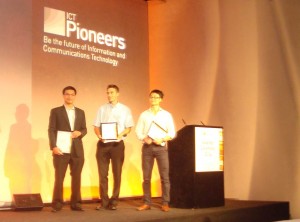 The simulator uses software to replicate the epidural process, thereby assisting in training for this delicate procedure that is performed over 1000 times each day in the UK.
The simulator uses software to replicate the epidural process, thereby assisting in training for this delicate procedure that is performed over 1000 times each day in the UK.

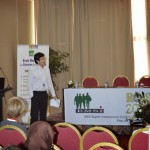
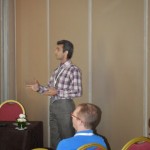
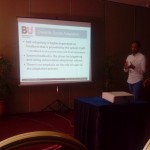




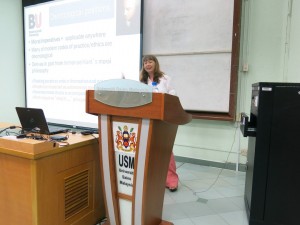
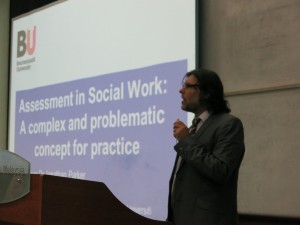
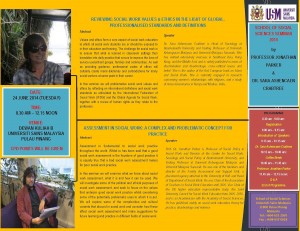



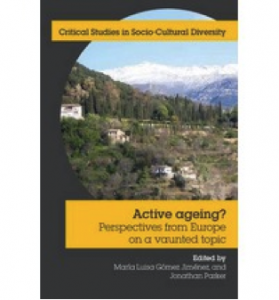












 Expand Your Impact: Collaboration and Networking Workshops for Researchers
Expand Your Impact: Collaboration and Networking Workshops for Researchers Visiting Prof. Sujan Marahatta presenting at BU
Visiting Prof. Sujan Marahatta presenting at BU 3C Event: Research Culture, Community & Can you Guess Who? Thursday 26 March 1-2pm
3C Event: Research Culture, Community & Can you Guess Who? Thursday 26 March 1-2pm UKCGE Recognised Research Supervision Programme: Deadline Approaching
UKCGE Recognised Research Supervision Programme: Deadline Approaching ECR Funding Open Call: Research Culture & Community Grant – Apply now
ECR Funding Open Call: Research Culture & Community Grant – Apply now ECR Funding Open Call: Research Culture & Community Grant – Application Deadline Friday 12 December
ECR Funding Open Call: Research Culture & Community Grant – Application Deadline Friday 12 December MSCA Postdoctoral Fellowships 2025 Call
MSCA Postdoctoral Fellowships 2025 Call ERC Advanced Grant 2025 Webinar
ERC Advanced Grant 2025 Webinar Update on UKRO services
Update on UKRO services European research project exploring use of ‘virtual twins’ to better manage metabolic associated fatty liver disease
European research project exploring use of ‘virtual twins’ to better manage metabolic associated fatty liver disease